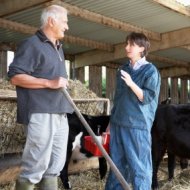New TB testing arrangements from April 2015

More than 2,000 individual vets are approved TB testers.
A tendering process is now underway to select delivery partners who will manage and monitor TB testing work in England and Wales.
Successful tenders will be announced in early 2015 by the Animal and Plant Health Agency (APHA), formerly the Animal Health and Veterinary Laboratories Agency.
Chosen partners will be responsible for testing in one or more regions in England and Wales.
At the present time, on-farm TB tests are done by private vets who are trained, appointed and paid by the APHA. The work is carried out by more than 2,000 approved individual vets and over 650 veterinary businesses.
From April next year, livestock keepers will need to liaise with their region's delivery partner and will continue to be responsible for arranging the tests. The work will be allocated and monitored by delivery partners in future.
When animal keepers request a particular sub-contracted veterinary business to carry out their tests, APHA says this will be honoured if possible. Keepers may also pay privately for tests to be done by other vets.
APHA's veterinary director Simon Hall said: "Testing will always be performed by a fully qualified vet but the new arrangements will help ensure that on-farm testing is as effective as it is possible to be in detecting disease, and that the taxpayer is only being asked to pay what is necessary for the testing."



 The latest
The latest